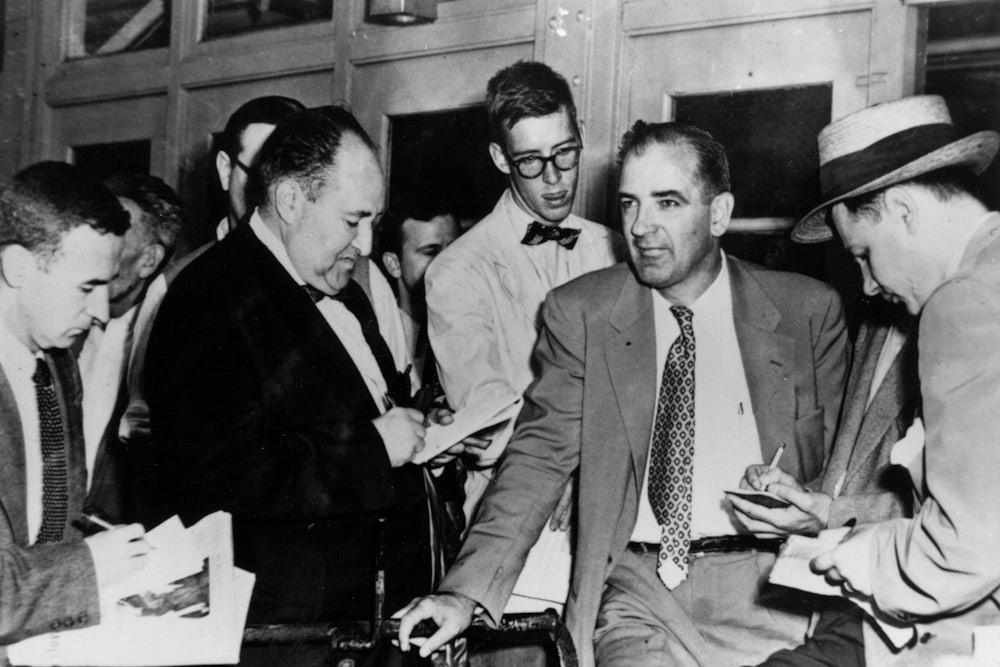When conservatism was a dirty word it seemed gallantly non-conformist to defend it against the big, smug liberal majority among one’s fellow writers and professors. But in the mood emerging from the 1950’s blunt speaking about conservatism’s important defects no longer runs the danger of obscuring its still more important virtues.
Nationalist demagogy, whether McCarthy style or John Birch style, would never have become such a nuisance if liberal intellectuals and New Dealers had earlier made themselves the controlling spearhead of American anti-Communism with the same fervor they had showed when spear-heading anti-Fascism. Such, at least, was my thesis in Shame and Glory of the Intellectuals. It was a thesis valid for the postwar Yalta era with its illusions about Communism then held by so many Henry Wallace “progressives.”
That era is long over. It is no longer in the interest of our two political camps to go on forever with such recriminations from the past. What is in the cooperative interest of both parties is to make sure that both are not replaced (after an intervening Kennedy era) by the “rejoicing third”: some new movement of nationalist demagogy. Conservatives have no more excuse to refuse to cooperate with liberals and New Dealers against right-wing nationalist threats to our shared liberties than to refuse to cooperate against comparable left-wing threats.
Fortunately many Burkean new conservatives—Raymond English, Chad Walsh, Thomas Cook, Clinton Rossiter, J. A. Lukacs, August Heckscher, Will Herberg, Reinhold Niebuhr, and other distinguished names—have always been active foes of the thought-control nationalists. Every one of these men had a record of all-out, explicit anti-McCarthyism in the days when that demagogue still seemed a danger and when it still took courage, not opportunism, to attack him. The same cannot be said of other, often better-known “new conservatives.” They failed the acid test of the McCarthy temptation of the 1950’s in the same way that the fellow-traveler failed the acid test of the Communist temptation of the 1930’s. Both temptations were not only tests of integrity; they were also tests of balance and good taste.
Even when avoiding the traps of right-wing radicalism, the new conservatism is partly guilty of causing the emotional deep-freeze that today makes so many young people ashamed of generous social impulses. Not only liberals but conservatives like Burke (reread his speeches against the slave trade), John Adams and John Quincy Adams (among America’s first fighters for Negro rights) have fought racism as contradicting our traditional view of man.
Humanistic and Materialistic Conservatives
The distinction between genuine conservatives and the rootless, counter-revolutionary doctrinaires who today call themselves conservatives is between two different groups in contemporary America: the humanistic value-conservers and the materialistic “Old Guard Republicans.” The latter are 19th Century Manchester liberals with roots no deeper than the relatively recent post-Civil War “gilded age.” As long ago as 1903 Winston Churchill denied them and their British counterparts the name of conservatives when he declared in Parliament: “The new fiscal policy [of high tariffs] means a change, not only in the historic English parties but in the conditions of our public life. The old Conservative Party with its religious convictions and constitutional principles will disappear and a new party will arise . . . like perhaps the Republican Party in the United States of America . . . rigid, materialist and secular, whose opinions will turn on tariffs and who will cause the lobbies to be crowded with the touts of protected industries.”
The Churchill quotation applies well to Senator Goldwater today. This charming and personable orator is a laissez-faire Manchester liberal when humane social reforms are at stake. But, as in the Churchill quotation, he is ready to make an exception when protection of privileged industry is involved.
Continuity with our liberal past simply means that you cannot escape from history. This shared past is a reality, not a rightist nostalgia, and out of it grow the New Deal and the Kennedy program, as opposed to the mechanical abstractions of either a Karl Marx or an Adam Smith. So let new conservatives stop becoming what they accuse liberals of being: rootless doctrinaires.
A contributor to the National Review and editor of the conservative Modern Age, Russell Kirk published an article (America, February 17, 1962) disassociating his conservatism and that of Senator Goldwater from the John Birch Society. Or rather, on closer reading, from Robert Welch. Does such an article refute, as it aims to do, the sort of criticism I have been making? Is there a clear break with the thought-control tyranny that has attracted so many “new conservatives”? Or is there merely an expedient disentanglement from the disreputable? Let us see.
James Reston (NY Times, February 7, 1962) quotes Kirk as calling Welch a “likable, honest, courageous, energetic man.” And the Kirk article itself condemns Welch chiefly because his regrettable “silliness” has “become the kiss of political death” for conservatives. This kind of condemnation sounds like something spoken more in sorrow than in anger. If the Birch Society were not the kiss of death but a bandwagon, would there be either cautious silence or open praise?
What forces us to ask these skeptical questions is this: the earlier silence of Kirk and most of his group about McCarthy and their own frequent adoption of McCarthyism-minus-McCarthy. If Kirk and his group had repudiated McCarthy in the early 1950’s—McCarthy who was dangerous, McCarthy who could strike back at them more than any Bircher, McCarthy who unlike Welch had a mass-base—then their McCarthy-corrupted kind of new conservatism would not be discredited today.
Actually the Kirk-Goldwater “courageous attack” on the Birch Society centers on Welch, who may soon be replaced anyhow (for having attacked too many Republicans instead of Democrats) and not on the Society itself. In the same America article. Kirk takes particular pains to suggest that the Society can be salvaged and need not dissolve itself provided Welch resigns: “In the Birch Society, he [Goldwater] says, are many good earnest people.” Cannot this also be said of the Communist Party? What is frightening is that these two champions of “American tradition,” Kirk and Goldwater, see nothing inherently untraditional or revolutionary in the concept (with or without Welch) of a Fascist-style secret society, based on the monolithic Fuehrer principle and conspiring to terrorize independent thinking by extra-legal methods.
On the contrary, not defense of civil liberties but defense of Goldwater is the sacred cause for which poor “kiss of death” Welch must be made to resign. One cannot but feel pity for Welch himself, so ruthlessly sacrificed for the sake of a bigger and better Welchism.
If Goldwater merely represented a school of economics, he still would not be a conservative; he would be a laissez-faire Manchester liberal. But at least, like such other Manchester liberals as James Mill and the early John Stuart Mill, he would then be a protector of civil liberties. Is he? He ardently defended the McCarthyite tyranny to the very end, backing McCarthy all over the country and voting for him when the Senate majority censured him. Kirk evades the point. He builds up Goldwater as a moderate by contrast with Welch: “Tolerant by nature, Barry Goldwater has spoken out with firmness against hysteria.” How easy to be tolerant and moderate if all you need as credential is the safe sport of baiting Welch.
But are not McCarthy and his movement dead and forgotten? Is it not clear to everyone that such fake anti-Communism and such Lumpen-conservatism have nothing to do with the serious anti-Communism or a responsible conservatism? No, apparently not. Somehow the responsible conservatives have failed to make their disclaimer ring true in broader circles. At least most liberals by now have made their disclaimer of Communism crystal-clear. In contrast, a big Chicago publisher on February 10, 1962, in announcing paperback reprints of “important” books espousing “the philosophy of intellectual conservatism,” headed that list with two books glorifying McCarthy. Today the shell of the “conservative” label has become at best a chrysalis for atomistic Manchester liberalism, opposite of organic unity; at worst for thought-controlling nationalism, uprooting the traditional liberties (including the Fifth Amendment) planted by America’s founders.
It is not a question of equating the American rightwing threat with the stronger and cleverer threat of Russian and Chinese Communist expansion. A sober comparative assessment would call the foreign Soviet the greatest threat, the domestic rightist the second greatest, and the domestic Communist Party the least by far. But only a monomaniac concentrates on a single menace, whether the greatest or the least of these three. An effective defense of freedom—by liberals, conservatives, and democratic socialists alike—would fight on all three fronts simultaneously, though not with equal resources and never equating all three. Such a pluralism of fronts also serves the purpose of preventing the secularized messianic crusades that are the curse of the 20th Century.
An Anti-Ideological Conservatism
It is not true that you can only defend freedom against the crusading Fascists or Communists by some monolithic counter-crusade and counter-ideology. Freedom’s strength is precisely that it is not confined to procrustean ideologies, that it has the classic virtues of balance, proportion and sense of humor. Totalitarianism is forced to retreat and recede, as in the de-Stalinizing renewal of the Soviet poets of the thaw and of the Poles at Poznan, not by counter-fanatics (who only egg it on) but by the pluralist quality of life itself. In the end Proteus conquers Procrustes.
It is misleading that “conservatism” contains the suffix “ism.” It is not an ism; Adams, Burke, Tocqueville detested all systems, all ideologies. It is a way of living, of balancing and harmonizing—not science but art. Thus envisaged, there seems no doubt at all that the finest conservative episode in American history, since the miracle of the Federalist papers, is the 1952 Presidential campaign of Adlai Stevenson. No figure in our time has better expressed the good-humored, pluralist harmonizing of isms and interests that compose the American reality. During the decade 1952-62, the creative role of Adlai Stevenson was the perfect object-lesson of how to attain liberal and conservative synthesis: Mill plus Burke; Jefferson plus John Adams; civil liberties and open-mindedness plus a noblesse-obligated, traditional, and very American spirit of aristocracy, a Periclean-democratic aristocracy. In careerist terms Stevenson failed, on election day, twice. But indirectly he achieved the perhaps more important success of lastingly raising the ethical and intellectual standards of both parties. That is why in the i960 campaign John F. Kennedy rose to the heights he was capable of, while Richard M. Nixon did not sink to the depths he was capable of.
In 1952 Stevenson said: “The strange alchemy of time has somehow converted the Democrats into the truly conservative party of this country— the party dedicated to conserving all that is best, and building solidly and safely on these foundations. The Republicans, by contrast, are behaving like the radical party—the party of the reckless and the embittered, bent on dismantling institutions which have been built solidly into our social fabric. ... Our social security system and our Democratic Party’s sponsorship of the social reforms and advances of the past two decades [are] conservatism at its best. Certainly, there could be nothing more conservative than to change when change is due, to reduce tensions and wants by wise changes, rather than to stand pat stubbornly, until like King Canute we are engulfed by relentless forces that will always go too far.”
And 10 years later Walter Lippmann made a similar statement (equally encouraging for those of us who want to take conservatism away from the “conservatives”): “Though Mr. Kennedy is a progressive and a liberal, he is also a profound conservative, and only the befuddled theorists find that strange and hard to understand.” Despite the befuddled theorists, liberalism and conservatism in America have frequently combined in the same statesman, with Lincoln the greatest example of all and with Kennedy and Stevenson being better liberals than the Popular Front liberal weeklies of the 1930’s and better conservatives than the rightist weeklies of the 1960’s.






